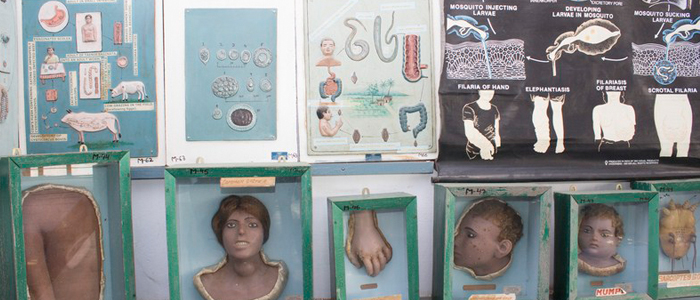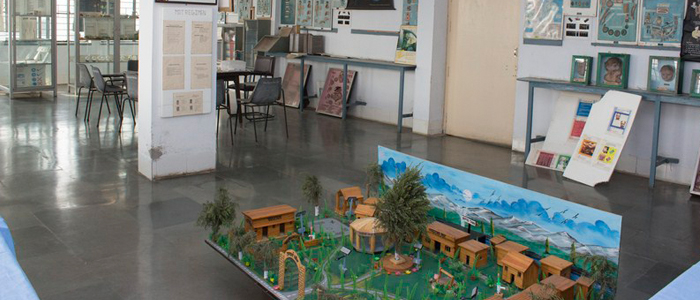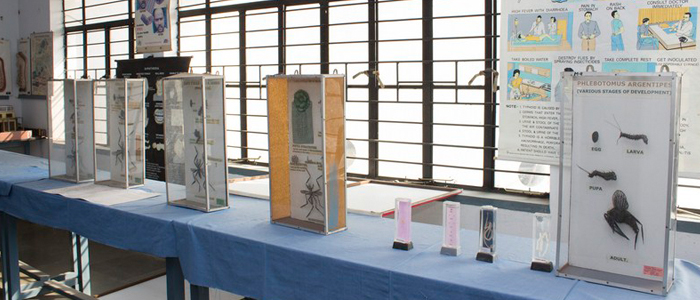OUR MOTO
"I WILL PREVENT DISEASE WHENEVER I CAN, FOR PREVENTION IS PREFERABLE TO CURE"
About Community Medicine
Community Medicine is the field concerned with the study of health and disease in the population of a defined community or group. Its goal is to identify the health problems and needs in a defined population and to plan, implement and evaluate the extent to which health measures effectively meet these needs.
In the MBBS course, the teaching of Community Medicine starts from the 1 st semester and continues until the 7 th semester. The teaching of Community Medicine is not limited within the four walls of the institution. There are Rural Health Training Centre (RHTC), Urban Health Training Centre (UHTC).Undergraduate and postgraduate students are posted in the RHTC and UHTC and they are taken to the rural field practice areas, urban slums for their training on community health problems. The department also participates in several National Health Programmes. The department conducts immunization programmes at this institution and also in rural and urban areas. Interns are posted at RHTC & UHTC for 2 months for their training on Public Health and Social Medicine. The department also conducts School Health Programmes in different Primary Schools and Health Surveys. Practical Examination (University) of this discipline is being conducted at Rural Field Practice areas.
This department has a Museum, Library, Research Laboratory etc. and conducts seminars, journal clubs, and group discussion regularly.
To train the "Basic Doctor" who is:
- Care Provider - Who considers the patient holistically as an individual and part of a family and provides high quality care which is continuous, complete and compassionate within a doctor- patient relationship based on mutual respect and trust.
- Able to use epidemiology as a scientific tool to make rational decisions relevant to community
- Decision Maker - Who chooses appropriate technology, which enhances patient care, is ethical and cost effective.
- Communicator - Who is able to promote healthy lifestyle by effective explanation and advocacy, thus empowering individuals and groups to improve and protect their health.
- Manager - Who can work efficiently and harmoniously with individuals and communities.
- Community leader - Who is able to gain local respect and trust, can reconcile individual action on behalf of the community.
Facilities
The department has well-equipped laboratory and museum. Seminar-cum- tutorial rooms are equipped with audio-visual aids. The departmental library in its shelves has textbooks, WHO, UNICEF and other publications and periodicals. The addition of computer, Laptop & LCD projector has enhanced teaching activities. Three rural PHCs and one urban PHC are established for teaching,training & health care delivery purposes since 1991. There is hostel accommodation in one rural PHC. The department is also conducting Under-five clinics in collaboration with dept. of Pediatrics, antenatal clinic in collaboration with department of G & O. Outreach immunization camp, health camp, school health survey & other research activities are also carried out on regular basis.
Training & teaching activities
Every undergraduate student is allotted families in the field practice area for the health problems
The department has adopted a unique innovative method of teaching-learning exercise known as case based teaching for undergraduate students. During these sessions students are made to understand the group dynamics and role of doctor–patient relations in patient management.
Visits to places of public health importance are arranged regularly for the benefit of both undergraduate and postgraduate students at their different levels of academic terms.
According to the recommendations of Medical Council of India, Interns are trained in rural/urban field practice areas for two months
The following activities are included in the regular weekly training schedule for the interns
- Out-patient clinics at urban & rural field practice areas
- School Health Services at urban & rural field practice areas
- Study of Clinico-social cases / Community family cases
- Health Education in Field areas & Hospital wards
- Under-five clinics & antenatal clinic
Journal club & seminar presentation is held in regular basis by the postgraduate students every week on Tuesdays & Thursdays respectively. Every postgraduate student is posted in rural & urban center for a period of 1 year.
Departmental library
The department library is well-endowed with nearly 270 books relevant to the field of public health,communicable and non-communicable diseases, research methodology, biostatistics and sociology. Besides, there are also several modules on health education contributed by National & International health agencies as well as overseas institutions. Select publications of WHO and the Govt. of India are available.
A Health Bulletin panel covering the latest public health initiatives/threats are updated on a daily basis by the postgraduate students of the department.
Departmental museum
The department has an excellent museum meant for the undergraduate & postgraduate medical students. This reinforces what has been taught in didactic lectures.
It consists over 200 panels covering subjects as varied as demography, family welfare, maternal and child health, nutrition, communicable and non-communicable diseases, health care of the community, medical entomology and international health etc.
Departmental public health laboratory
There are two well equipped laboratories in the department - one for undergraduate & another for research purpose.
Epidemiological & statistical section
This section has been actively involved in data management, statistical analysis, report writing and training in collaboration with other departments of the institution.


